Exploring Business Challenges at Woolworths: Annotated Bibliography
VerifiedAdded on 2023/01/23
|7
|2200
|28
Annotated Bibliography
AI Summary
This annotated bibliography examines various business issues faced by Woolworths, Australia's largest supermarket chain. The bibliography covers a range of challenges, including employee retention problems, market competition, and the impact of boycotts and protests on brand reputation. It explores strategies for adapting to market changes, improving sustainability, and addressing food insecurity. The sources discussed highlight issues such as lack of competition, unconscionable conduct, governance problems, and the evolution of sustainability practices within the organization. The bibliography provides insights into Woolworths' internal and external challenges, emphasizing the need for effective employee training, strategic commitment to innovation, and responsiveness to environmental and social issues. The conclusion summarizes the key challenges related to employee performance, customer satisfaction, and market dynamics.
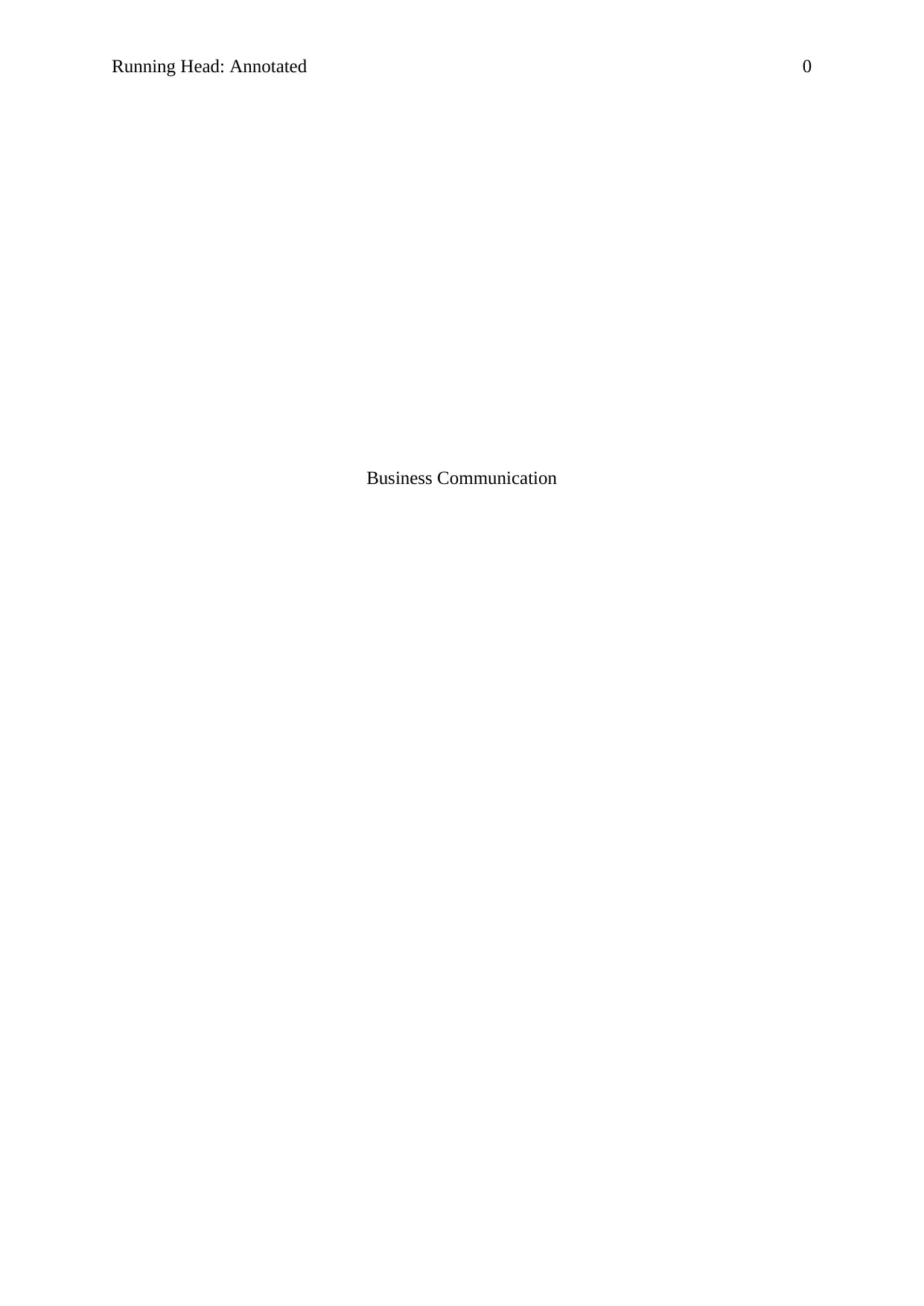
Running Head: Annotated 0
Business Communication
Business Communication
Paraphrase This Document
Need a fresh take? Get an instant paraphrase of this document with our AI Paraphraser
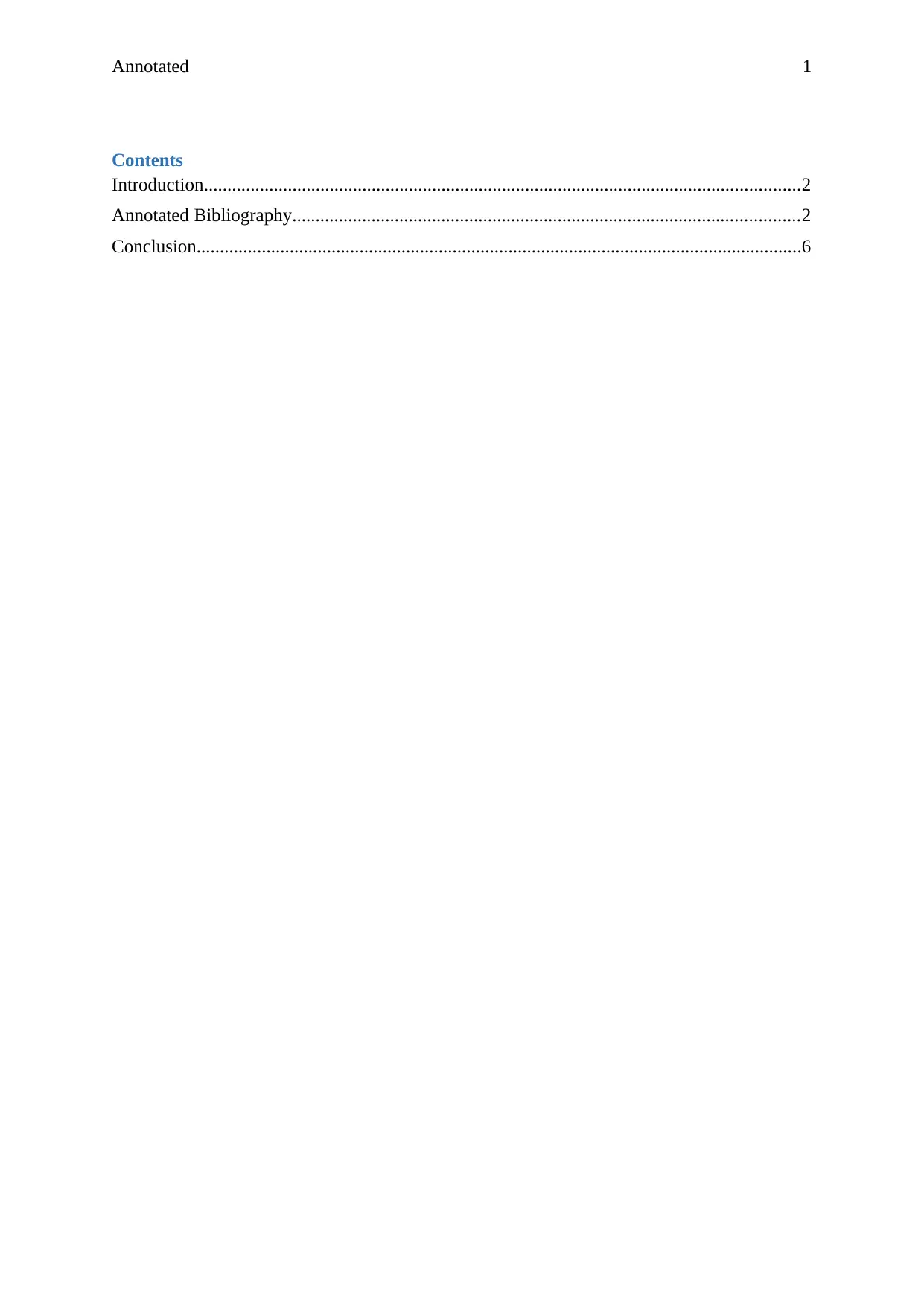
Annotated 1
Contents
Introduction................................................................................................................................2
Annotated Bibliography.............................................................................................................2
Conclusion..................................................................................................................................6
Contents
Introduction................................................................................................................................2
Annotated Bibliography.............................................................................................................2
Conclusion..................................................................................................................................6
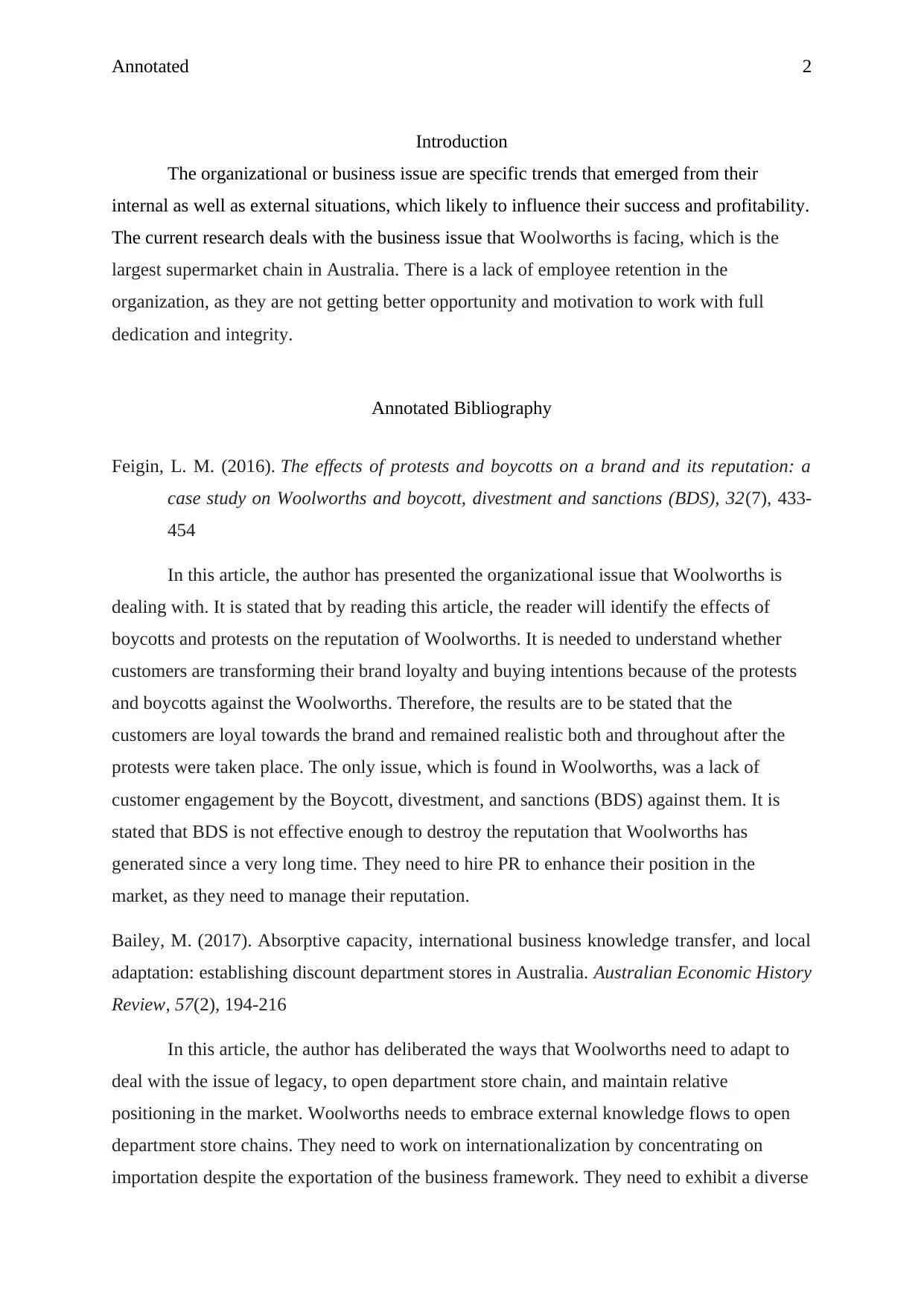
Annotated 2
Introduction
The organizational or business issue are specific trends that emerged from their
internal as well as external situations, which likely to influence their success and profitability.
The current research deals with the business issue that Woolworths is facing, which is the
largest supermarket chain in Australia. There is a lack of employee retention in the
organization, as they are not getting better opportunity and motivation to work with full
dedication and integrity.
Annotated Bibliography
Feigin, L. M. (2016). The effects of protests and boycotts on a brand and its reputation: a
case study on Woolworths and boycott, divestment and sanctions (BDS), 32(7), 433-
454
In this article, the author has presented the organizational issue that Woolworths is
dealing with. It is stated that by reading this article, the reader will identify the effects of
boycotts and protests on the reputation of Woolworths. It is needed to understand whether
customers are transforming their brand loyalty and buying intentions because of the protests
and boycotts against the Woolworths. Therefore, the results are to be stated that the
customers are loyal towards the brand and remained realistic both and throughout after the
protests were taken place. The only issue, which is found in Woolworths, was a lack of
customer engagement by the Boycott, divestment, and sanctions (BDS) against them. It is
stated that BDS is not effective enough to destroy the reputation that Woolworths has
generated since a very long time. They need to hire PR to enhance their position in the
market, as they need to manage their reputation.
Bailey, M. (2017). Absorptive capacity, international business knowledge transfer, and local
adaptation: establishing discount department stores in Australia. Australian Economic History
Review, 57(2), 194-216
In this article, the author has deliberated the ways that Woolworths need to adapt to
deal with the issue of legacy, to open department store chain, and maintain relative
positioning in the market. Woolworths needs to embrace external knowledge flows to open
department store chains. They need to work on internationalization by concentrating on
importation despite the exportation of the business framework. They need to exhibit a diverse
Introduction
The organizational or business issue are specific trends that emerged from their
internal as well as external situations, which likely to influence their success and profitability.
The current research deals with the business issue that Woolworths is facing, which is the
largest supermarket chain in Australia. There is a lack of employee retention in the
organization, as they are not getting better opportunity and motivation to work with full
dedication and integrity.
Annotated Bibliography
Feigin, L. M. (2016). The effects of protests and boycotts on a brand and its reputation: a
case study on Woolworths and boycott, divestment and sanctions (BDS), 32(7), 433-
454
In this article, the author has presented the organizational issue that Woolworths is
dealing with. It is stated that by reading this article, the reader will identify the effects of
boycotts and protests on the reputation of Woolworths. It is needed to understand whether
customers are transforming their brand loyalty and buying intentions because of the protests
and boycotts against the Woolworths. Therefore, the results are to be stated that the
customers are loyal towards the brand and remained realistic both and throughout after the
protests were taken place. The only issue, which is found in Woolworths, was a lack of
customer engagement by the Boycott, divestment, and sanctions (BDS) against them. It is
stated that BDS is not effective enough to destroy the reputation that Woolworths has
generated since a very long time. They need to hire PR to enhance their position in the
market, as they need to manage their reputation.
Bailey, M. (2017). Absorptive capacity, international business knowledge transfer, and local
adaptation: establishing discount department stores in Australia. Australian Economic History
Review, 57(2), 194-216
In this article, the author has deliberated the ways that Woolworths need to adapt to
deal with the issue of legacy, to open department store chain, and maintain relative
positioning in the market. Woolworths needs to embrace external knowledge flows to open
department store chains. They need to work on internationalization by concentrating on
importation despite the exportation of the business framework. They need to exhibit a diverse
⊘ This is a preview!⊘
Do you want full access?
Subscribe today to unlock all pages.

Trusted by 1+ million students worldwide
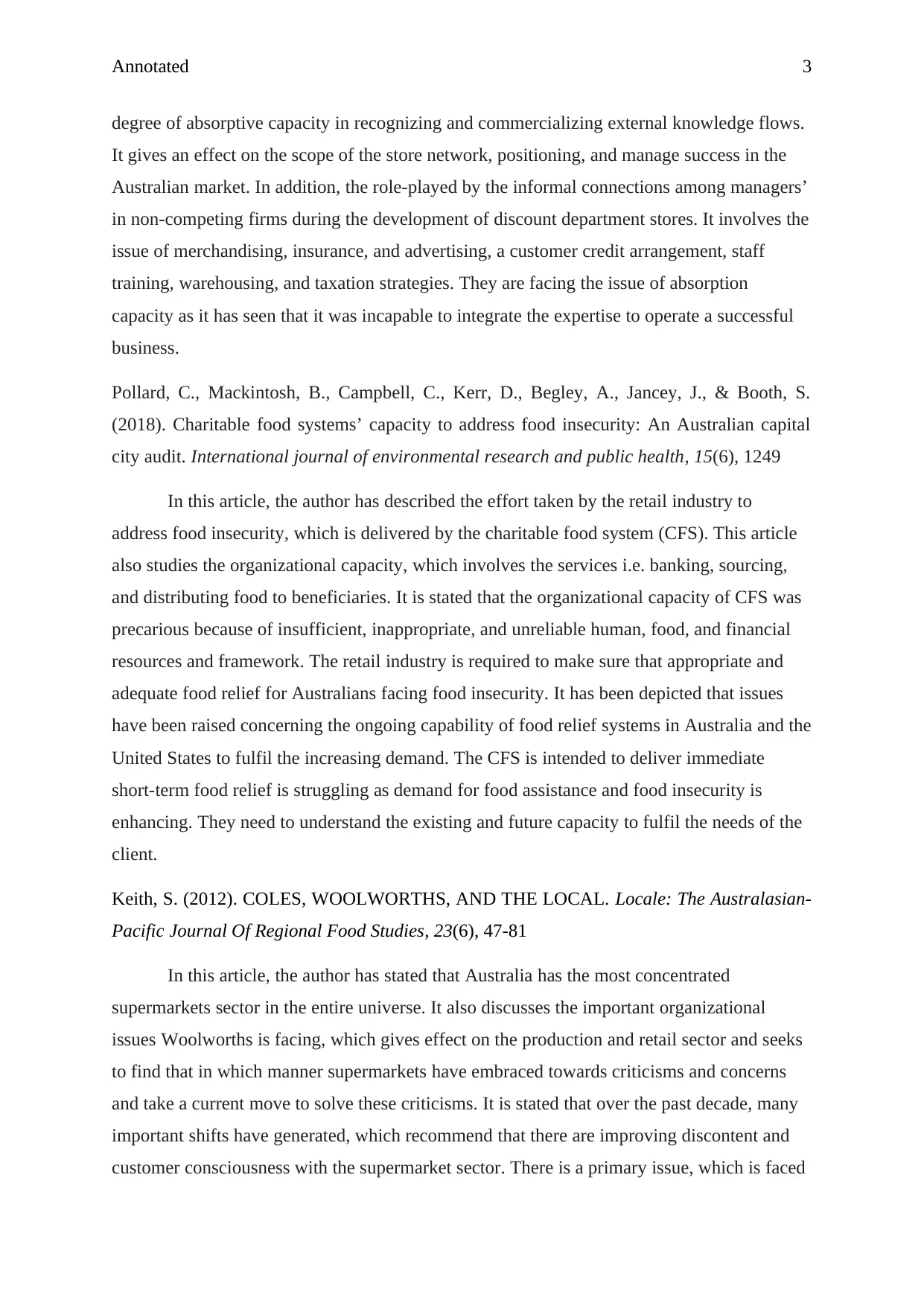
Annotated 3
degree of absorptive capacity in recognizing and commercializing external knowledge flows.
It gives an effect on the scope of the store network, positioning, and manage success in the
Australian market. In addition, the role-played by the informal connections among managers’
in non-competing firms during the development of discount department stores. It involves the
issue of merchandising, insurance, and advertising, a customer credit arrangement, staff
training, warehousing, and taxation strategies. They are facing the issue of absorption
capacity as it has seen that it was incapable to integrate the expertise to operate a successful
business.
Pollard, C., Mackintosh, B., Campbell, C., Kerr, D., Begley, A., Jancey, J., & Booth, S.
(2018). Charitable food systems’ capacity to address food insecurity: An Australian capital
city audit. International journal of environmental research and public health, 15(6), 1249
In this article, the author has described the effort taken by the retail industry to
address food insecurity, which is delivered by the charitable food system (CFS). This article
also studies the organizational capacity, which involves the services i.e. banking, sourcing,
and distributing food to beneficiaries. It is stated that the organizational capacity of CFS was
precarious because of insufficient, inappropriate, and unreliable human, food, and financial
resources and framework. The retail industry is required to make sure that appropriate and
adequate food relief for Australians facing food insecurity. It has been depicted that issues
have been raised concerning the ongoing capability of food relief systems in Australia and the
United States to fulfil the increasing demand. The CFS is intended to deliver immediate
short-term food relief is struggling as demand for food assistance and food insecurity is
enhancing. They need to understand the existing and future capacity to fulfil the needs of the
client.
Keith, S. (2012). COLES, WOOLWORTHS, AND THE LOCAL. Locale: The Australasian-
Pacific Journal Of Regional Food Studies, 23(6), 47-81
In this article, the author has stated that Australia has the most concentrated
supermarkets sector in the entire universe. It also discusses the important organizational
issues Woolworths is facing, which gives effect on the production and retail sector and seeks
to find that in which manner supermarkets have embraced towards criticisms and concerns
and take a current move to solve these criticisms. It is stated that over the past decade, many
important shifts have generated, which recommend that there are improving discontent and
customer consciousness with the supermarket sector. There is a primary issue, which is faced
degree of absorptive capacity in recognizing and commercializing external knowledge flows.
It gives an effect on the scope of the store network, positioning, and manage success in the
Australian market. In addition, the role-played by the informal connections among managers’
in non-competing firms during the development of discount department stores. It involves the
issue of merchandising, insurance, and advertising, a customer credit arrangement, staff
training, warehousing, and taxation strategies. They are facing the issue of absorption
capacity as it has seen that it was incapable to integrate the expertise to operate a successful
business.
Pollard, C., Mackintosh, B., Campbell, C., Kerr, D., Begley, A., Jancey, J., & Booth, S.
(2018). Charitable food systems’ capacity to address food insecurity: An Australian capital
city audit. International journal of environmental research and public health, 15(6), 1249
In this article, the author has described the effort taken by the retail industry to
address food insecurity, which is delivered by the charitable food system (CFS). This article
also studies the organizational capacity, which involves the services i.e. banking, sourcing,
and distributing food to beneficiaries. It is stated that the organizational capacity of CFS was
precarious because of insufficient, inappropriate, and unreliable human, food, and financial
resources and framework. The retail industry is required to make sure that appropriate and
adequate food relief for Australians facing food insecurity. It has been depicted that issues
have been raised concerning the ongoing capability of food relief systems in Australia and the
United States to fulfil the increasing demand. The CFS is intended to deliver immediate
short-term food relief is struggling as demand for food assistance and food insecurity is
enhancing. They need to understand the existing and future capacity to fulfil the needs of the
client.
Keith, S. (2012). COLES, WOOLWORTHS, AND THE LOCAL. Locale: The Australasian-
Pacific Journal Of Regional Food Studies, 23(6), 47-81
In this article, the author has stated that Australia has the most concentrated
supermarkets sector in the entire universe. It also discusses the important organizational
issues Woolworths is facing, which gives effect on the production and retail sector and seeks
to find that in which manner supermarkets have embraced towards criticisms and concerns
and take a current move to solve these criticisms. It is stated that over the past decade, many
important shifts have generated, which recommend that there are improving discontent and
customer consciousness with the supermarket sector. There is a primary issue, which is faced
Paraphrase This Document
Need a fresh take? Get an instant paraphrase of this document with our AI Paraphraser
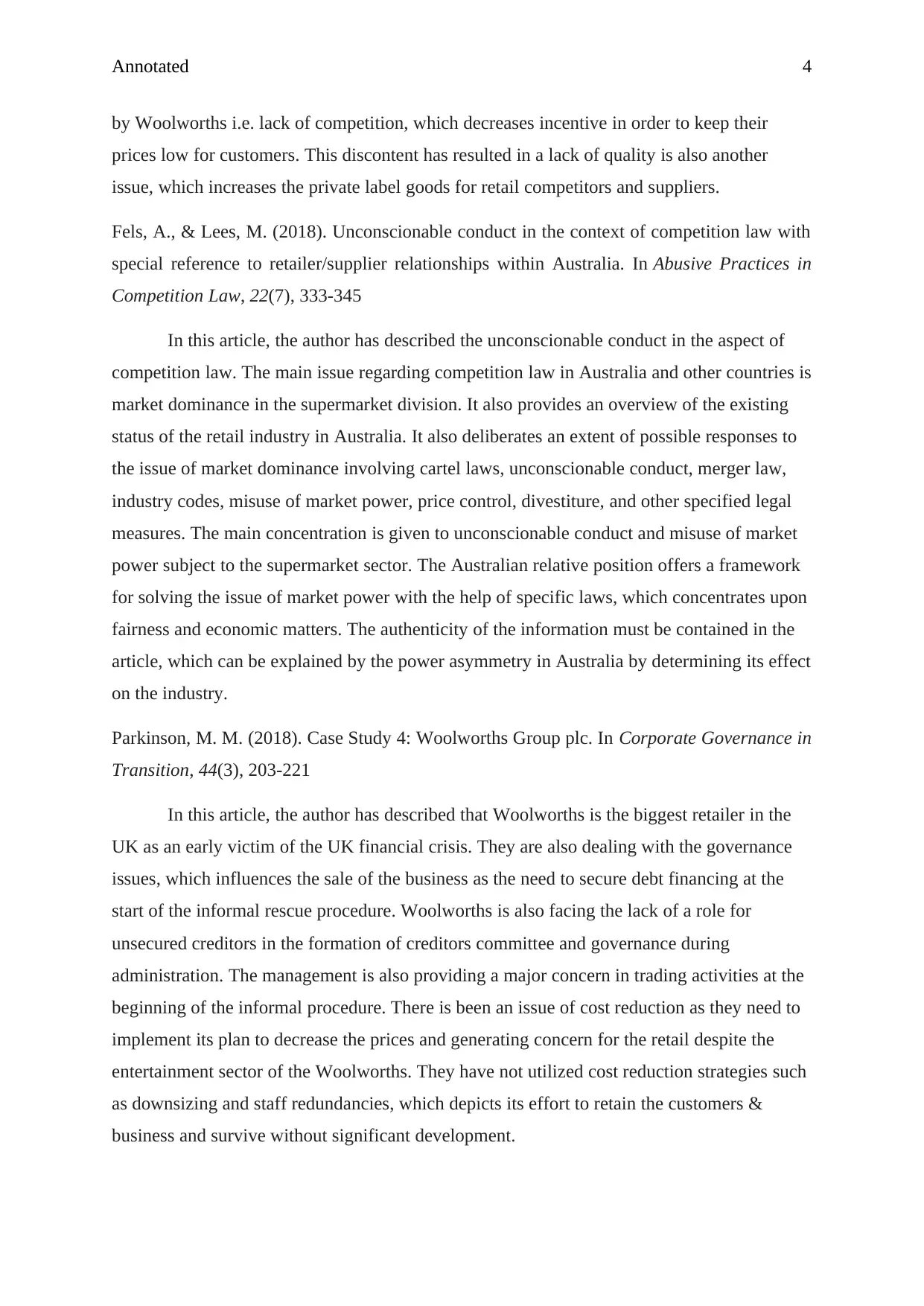
Annotated 4
by Woolworths i.e. lack of competition, which decreases incentive in order to keep their
prices low for customers. This discontent has resulted in a lack of quality is also another
issue, which increases the private label goods for retail competitors and suppliers.
Fels, A., & Lees, M. (2018). Unconscionable conduct in the context of competition law with
special reference to retailer/supplier relationships within Australia. In Abusive Practices in
Competition Law, 22(7), 333-345
In this article, the author has described the unconscionable conduct in the aspect of
competition law. The main issue regarding competition law in Australia and other countries is
market dominance in the supermarket division. It also provides an overview of the existing
status of the retail industry in Australia. It also deliberates an extent of possible responses to
the issue of market dominance involving cartel laws, unconscionable conduct, merger law,
industry codes, misuse of market power, price control, divestiture, and other specified legal
measures. The main concentration is given to unconscionable conduct and misuse of market
power subject to the supermarket sector. The Australian relative position offers a framework
for solving the issue of market power with the help of specific laws, which concentrates upon
fairness and economic matters. The authenticity of the information must be contained in the
article, which can be explained by the power asymmetry in Australia by determining its effect
on the industry.
Parkinson, M. M. (2018). Case Study 4: Woolworths Group plc. In Corporate Governance in
Transition, 44(3), 203-221
In this article, the author has described that Woolworths is the biggest retailer in the
UK as an early victim of the UK financial crisis. They are also dealing with the governance
issues, which influences the sale of the business as the need to secure debt financing at the
start of the informal rescue procedure. Woolworths is also facing the lack of a role for
unsecured creditors in the formation of creditors committee and governance during
administration. The management is also providing a major concern in trading activities at the
beginning of the informal procedure. There is been an issue of cost reduction as they need to
implement its plan to decrease the prices and generating concern for the retail despite the
entertainment sector of the Woolworths. They have not utilized cost reduction strategies such
as downsizing and staff redundancies, which depicts its effort to retain the customers &
business and survive without significant development.
by Woolworths i.e. lack of competition, which decreases incentive in order to keep their
prices low for customers. This discontent has resulted in a lack of quality is also another
issue, which increases the private label goods for retail competitors and suppliers.
Fels, A., & Lees, M. (2018). Unconscionable conduct in the context of competition law with
special reference to retailer/supplier relationships within Australia. In Abusive Practices in
Competition Law, 22(7), 333-345
In this article, the author has described the unconscionable conduct in the aspect of
competition law. The main issue regarding competition law in Australia and other countries is
market dominance in the supermarket division. It also provides an overview of the existing
status of the retail industry in Australia. It also deliberates an extent of possible responses to
the issue of market dominance involving cartel laws, unconscionable conduct, merger law,
industry codes, misuse of market power, price control, divestiture, and other specified legal
measures. The main concentration is given to unconscionable conduct and misuse of market
power subject to the supermarket sector. The Australian relative position offers a framework
for solving the issue of market power with the help of specific laws, which concentrates upon
fairness and economic matters. The authenticity of the information must be contained in the
article, which can be explained by the power asymmetry in Australia by determining its effect
on the industry.
Parkinson, M. M. (2018). Case Study 4: Woolworths Group plc. In Corporate Governance in
Transition, 44(3), 203-221
In this article, the author has described that Woolworths is the biggest retailer in the
UK as an early victim of the UK financial crisis. They are also dealing with the governance
issues, which influences the sale of the business as the need to secure debt financing at the
start of the informal rescue procedure. Woolworths is also facing the lack of a role for
unsecured creditors in the formation of creditors committee and governance during
administration. The management is also providing a major concern in trading activities at the
beginning of the informal procedure. There is been an issue of cost reduction as they need to
implement its plan to decrease the prices and generating concern for the retail despite the
entertainment sector of the Woolworths. They have not utilized cost reduction strategies such
as downsizing and staff redundancies, which depicts its effort to retain the customers &
business and survive without significant development.
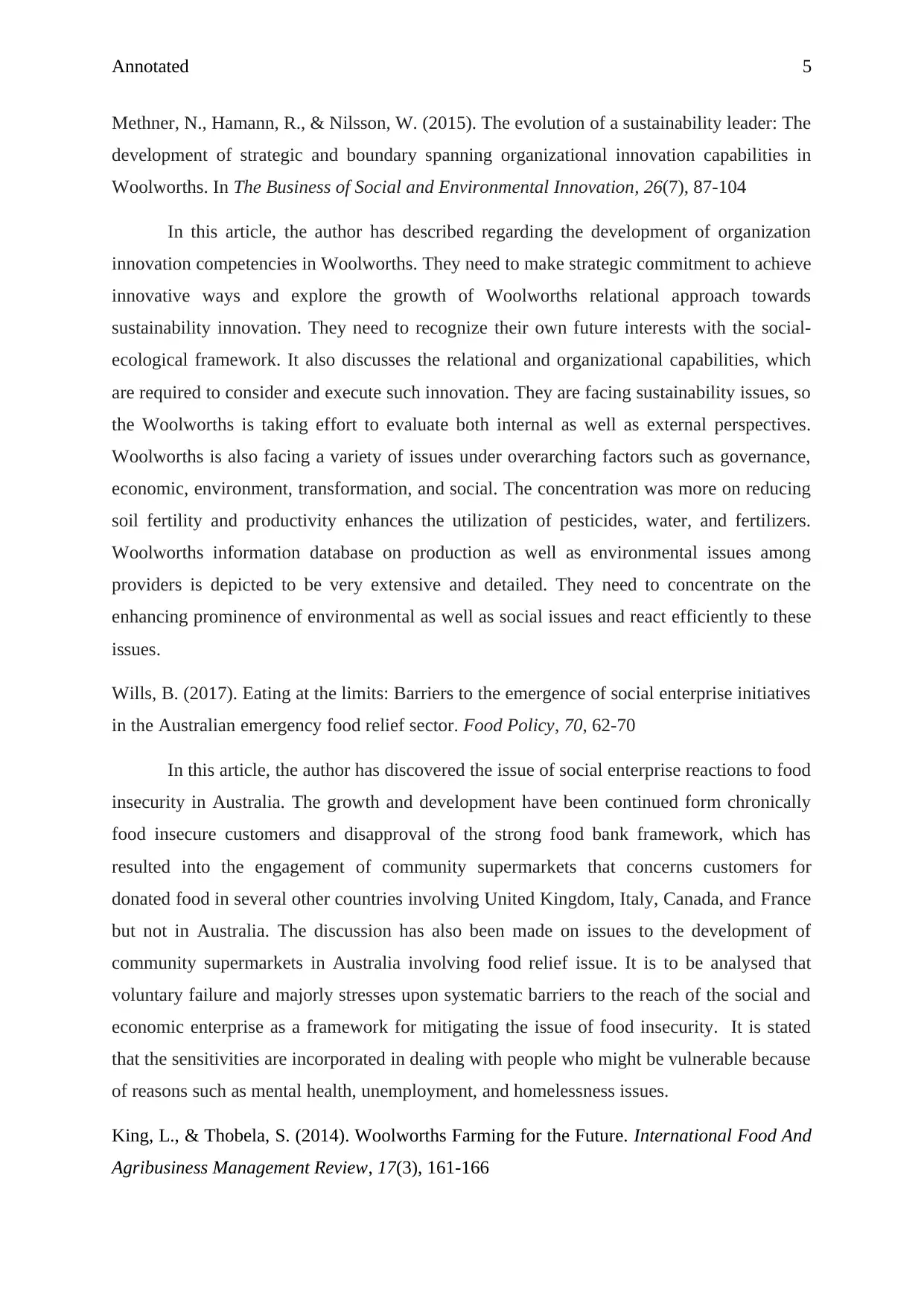
Annotated 5
Methner, N., Hamann, R., & Nilsson, W. (2015). The evolution of a sustainability leader: The
development of strategic and boundary spanning organizational innovation capabilities in
Woolworths. In The Business of Social and Environmental Innovation, 26(7), 87-104
In this article, the author has described regarding the development of organization
innovation competencies in Woolworths. They need to make strategic commitment to achieve
innovative ways and explore the growth of Woolworths relational approach towards
sustainability innovation. They need to recognize their own future interests with the social-
ecological framework. It also discusses the relational and organizational capabilities, which
are required to consider and execute such innovation. They are facing sustainability issues, so
the Woolworths is taking effort to evaluate both internal as well as external perspectives.
Woolworths is also facing a variety of issues under overarching factors such as governance,
economic, environment, transformation, and social. The concentration was more on reducing
soil fertility and productivity enhances the utilization of pesticides, water, and fertilizers.
Woolworths information database on production as well as environmental issues among
providers is depicted to be very extensive and detailed. They need to concentrate on the
enhancing prominence of environmental as well as social issues and react efficiently to these
issues.
Wills, B. (2017). Eating at the limits: Barriers to the emergence of social enterprise initiatives
in the Australian emergency food relief sector. Food Policy, 70, 62-70
In this article, the author has discovered the issue of social enterprise reactions to food
insecurity in Australia. The growth and development have been continued form chronically
food insecure customers and disapproval of the strong food bank framework, which has
resulted into the engagement of community supermarkets that concerns customers for
donated food in several other countries involving United Kingdom, Italy, Canada, and France
but not in Australia. The discussion has also been made on issues to the development of
community supermarkets in Australia involving food relief issue. It is to be analysed that
voluntary failure and majorly stresses upon systematic barriers to the reach of the social and
economic enterprise as a framework for mitigating the issue of food insecurity. It is stated
that the sensitivities are incorporated in dealing with people who might be vulnerable because
of reasons such as mental health, unemployment, and homelessness issues.
King, L., & Thobela, S. (2014). Woolworths Farming for the Future. International Food And
Agribusiness Management Review, 17(3), 161-166
Methner, N., Hamann, R., & Nilsson, W. (2015). The evolution of a sustainability leader: The
development of strategic and boundary spanning organizational innovation capabilities in
Woolworths. In The Business of Social and Environmental Innovation, 26(7), 87-104
In this article, the author has described regarding the development of organization
innovation competencies in Woolworths. They need to make strategic commitment to achieve
innovative ways and explore the growth of Woolworths relational approach towards
sustainability innovation. They need to recognize their own future interests with the social-
ecological framework. It also discusses the relational and organizational capabilities, which
are required to consider and execute such innovation. They are facing sustainability issues, so
the Woolworths is taking effort to evaluate both internal as well as external perspectives.
Woolworths is also facing a variety of issues under overarching factors such as governance,
economic, environment, transformation, and social. The concentration was more on reducing
soil fertility and productivity enhances the utilization of pesticides, water, and fertilizers.
Woolworths information database on production as well as environmental issues among
providers is depicted to be very extensive and detailed. They need to concentrate on the
enhancing prominence of environmental as well as social issues and react efficiently to these
issues.
Wills, B. (2017). Eating at the limits: Barriers to the emergence of social enterprise initiatives
in the Australian emergency food relief sector. Food Policy, 70, 62-70
In this article, the author has discovered the issue of social enterprise reactions to food
insecurity in Australia. The growth and development have been continued form chronically
food insecure customers and disapproval of the strong food bank framework, which has
resulted into the engagement of community supermarkets that concerns customers for
donated food in several other countries involving United Kingdom, Italy, Canada, and France
but not in Australia. The discussion has also been made on issues to the development of
community supermarkets in Australia involving food relief issue. It is to be analysed that
voluntary failure and majorly stresses upon systematic barriers to the reach of the social and
economic enterprise as a framework for mitigating the issue of food insecurity. It is stated
that the sensitivities are incorporated in dealing with people who might be vulnerable because
of reasons such as mental health, unemployment, and homelessness issues.
King, L., & Thobela, S. (2014). Woolworths Farming for the Future. International Food And
Agribusiness Management Review, 17(3), 161-166
⊘ This is a preview!⊘
Do you want full access?
Subscribe today to unlock all pages.

Trusted by 1+ million students worldwide
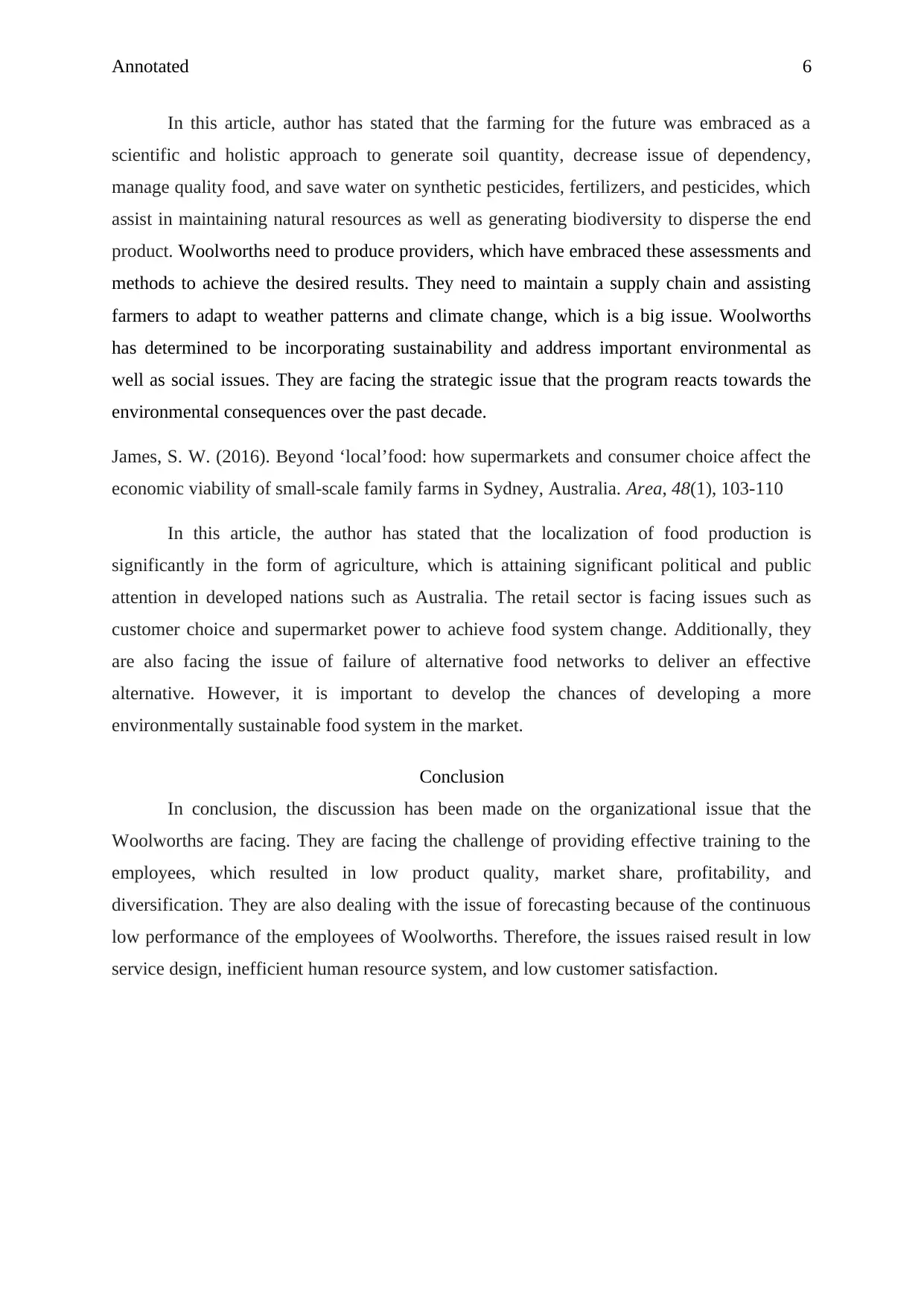
Annotated 6
In this article, author has stated that the farming for the future was embraced as a
scientific and holistic approach to generate soil quantity, decrease issue of dependency,
manage quality food, and save water on synthetic pesticides, fertilizers, and pesticides, which
assist in maintaining natural resources as well as generating biodiversity to disperse the end
product. Woolworths need to produce providers, which have embraced these assessments and
methods to achieve the desired results. They need to maintain a supply chain and assisting
farmers to adapt to weather patterns and climate change, which is a big issue. Woolworths
has determined to be incorporating sustainability and address important environmental as
well as social issues. They are facing the strategic issue that the program reacts towards the
environmental consequences over the past decade.
James, S. W. (2016). Beyond ‘local’food: how supermarkets and consumer choice affect the
economic viability of small‐scale family farms in Sydney, Australia. Area, 48(1), 103-110
In this article, the author has stated that the localization of food production is
significantly in the form of agriculture, which is attaining significant political and public
attention in developed nations such as Australia. The retail sector is facing issues such as
customer choice and supermarket power to achieve food system change. Additionally, they
are also facing the issue of failure of alternative food networks to deliver an effective
alternative. However, it is important to develop the chances of developing a more
environmentally sustainable food system in the market.
Conclusion
In conclusion, the discussion has been made on the organizational issue that the
Woolworths are facing. They are facing the challenge of providing effective training to the
employees, which resulted in low product quality, market share, profitability, and
diversification. They are also dealing with the issue of forecasting because of the continuous
low performance of the employees of Woolworths. Therefore, the issues raised result in low
service design, inefficient human resource system, and low customer satisfaction.
In this article, author has stated that the farming for the future was embraced as a
scientific and holistic approach to generate soil quantity, decrease issue of dependency,
manage quality food, and save water on synthetic pesticides, fertilizers, and pesticides, which
assist in maintaining natural resources as well as generating biodiversity to disperse the end
product. Woolworths need to produce providers, which have embraced these assessments and
methods to achieve the desired results. They need to maintain a supply chain and assisting
farmers to adapt to weather patterns and climate change, which is a big issue. Woolworths
has determined to be incorporating sustainability and address important environmental as
well as social issues. They are facing the strategic issue that the program reacts towards the
environmental consequences over the past decade.
James, S. W. (2016). Beyond ‘local’food: how supermarkets and consumer choice affect the
economic viability of small‐scale family farms in Sydney, Australia. Area, 48(1), 103-110
In this article, the author has stated that the localization of food production is
significantly in the form of agriculture, which is attaining significant political and public
attention in developed nations such as Australia. The retail sector is facing issues such as
customer choice and supermarket power to achieve food system change. Additionally, they
are also facing the issue of failure of alternative food networks to deliver an effective
alternative. However, it is important to develop the chances of developing a more
environmentally sustainable food system in the market.
Conclusion
In conclusion, the discussion has been made on the organizational issue that the
Woolworths are facing. They are facing the challenge of providing effective training to the
employees, which resulted in low product quality, market share, profitability, and
diversification. They are also dealing with the issue of forecasting because of the continuous
low performance of the employees of Woolworths. Therefore, the issues raised result in low
service design, inefficient human resource system, and low customer satisfaction.
1 out of 7
Related Documents
Your All-in-One AI-Powered Toolkit for Academic Success.
+13062052269
info@desklib.com
Available 24*7 on WhatsApp / Email
![[object Object]](/_next/static/media/star-bottom.7253800d.svg)
Unlock your academic potential
Copyright © 2020–2026 A2Z Services. All Rights Reserved. Developed and managed by ZUCOL.



